- Home
- Jess Walter
Ruby Ridge: The Truth and Tragedy of the Randy Weaver Family Page 2
Ruby Ridge: The Truth and Tragedy of the Randy Weaver Family Read online
Page 2
No, he’d done everything possible. That was true enough. This case had gotten out of control because Randy and Vicki Weaver wanted it this way. But Dave Hunt couldn’t scare off the self-doubt as he churned up his own dust pacing and smoking in a mountain field that had been nicknamed years earlier Homicide Meadow.
THROUGH THE MEADOW, the dirt road dipped and twisted for two more miles, widened and came to a halt at a bridge that crossed Ruby Creek and T-boned into the old highway, where two armed sides faced off and the threat of violence hung in the air like fall.
The two sides—Randy Weaver’s supporters and the government agents—were separated only by the yellow police tape and the rippling water. On the bridge, cordoned off by the plastic tape, police cars, a military truck, and a motor home blocked the only road up Ruby Ridge.
A dozen state and federal agents with machine guns and bulletproof vests watched a crowd that grew larger and angrier by the minute. The agents lowered the tape so another green Humvee—a short, fat, military truck—could rumble past, and immediately the yelling started again.
A ponytailed man with a day’s blond growth stepped forward from a pack of bitter, bearded men in jeans and mesh baseball caps. He jammed his index finger at the windows of the military vehicles and yelled at the drivers. “Baby killer! Baby killer! Which one of you is going to shoot the baby?” On the other side of the tape, the federal agents shifted their rifles like bachelors holding infants. The protesters—perhaps fifty now—closed in around the roadblock and held up signs—”You Could Be Next!” and “It’s Time For War!”—some with misspellings that made the agents laugh nervously: “Our mountians were peacefull untill now.” At one end of the police tape, a camouflaged ATF agent videotaped a bowlegged man in a black T-shirt, who, in turn, videotaped the ATF agent videotaping him.
Behind them, a nineteen-year-old boy from Las Vegas argued with his buddies over whether they should be wearing brown shirts or the black ones that all the other skinheads were wearing. Hitler’s original force had been the Brownshirts, the boy explained, cocking his shaved head. “Maybe black is scarier, but I wanted to wear brown, to let the Jews and niggers know who’s coming after them.”
On their own shoulder of the road, television satellite trucks hummed and photographers circled around the yelling protesters, who fanned out against the banks of the old highway. Reporters and photographers milled about, wishing they could get closer to the cabin, stuck here interviewing anyone who didn’t look too violent. They half expected shooting to break out here at any time.
One of Vicki Weaver’s friends held court with three reporters, explaining that Vicki was nothing short of a prophetess, touched by her creator and convinced that whites should separate themselves from other races. Yes, Vicki Weaver was a white separatist. But hadn’t Malcolm X preached separation of races? Didn’t Indian leaders fight for their own sovereign nations? Why were they the subject of flattering movies while the Weavers were the subject of a government setup and attack? “Randy and Vicki and the kids are a family,” she said, pointing across the police tape. “Those are the criminals.”
In the road’s other grassy shoulder, children in denim jackets and cowboy boots penned protest signs—”Go Home” and “Zionast pig—Why don’t you shoot me too?”—and held them up for their parents, who stood in clusters, talking about what was happening on the mountain. “They’re going to gas the whole family!” Tax protesters, constitutionalists, Vietnam veterans, mountain folk, and skinheads raged and shook their fists, wondering what they could possibly do to stop this injustice, wondering which of them would be next.
A car trolled along the old highway, past the tense balance of protesters and law enforcement. The car slowed, but there was nowhere to park because other vehicles were strung along either side of the roadblock for several hundred yards—cars from fourteen states and one with a license plate that simply read HEAVEN. The driver had to take a wide corner before finding a place to park, a quarter mile from the roadblock, just down the narrow road, near the dark-wooded Deep Creek Inn, from whose doorway a confused Swiss chef named Lorenz Caduff watched protesters and law enforcement officers parade past.
Caduff had only been in North Idaho six weeks, and it had seemed like paradise until now. Now it was crazy, FBI agents running in and out of his business, neo-Nazi skinheads living in tents in his yard, strangers sleeping on his floor. He’d sent his wife and kids away and worked twenty hours a day, serving up plates of biscuits and country gravy to people who told him the government was trying to kill them. An earnest, friendly man, Lorenz liked everyone, trusted everyone, and struggled to understand who was right.
How could people in the greatest country in the world fear their own government? And yet, why did the government use tanks and armies to arrest one man? That’s when Lorenz began to wonder: Will they come for me too?
Another car cruised past the Deep Creek, a Jeep Cherokee filled with five skinheads from Oregon, all of them between the ages of nineteen and twenty-four. They were looking for a gun shop to buy some rifles and ammunition and to ask for directions up to Randy Weaver’s cabin.
THE OLD HIGHWAY ran parallel to the new one, an asphalt ribbon that actually had lines painted on it and that bisected the glacial valley for another twenty miles before finding civilization in the resort town of Sandpoint. In a motel at the edge of town, a solid Iowa farmer named David Jordison peered at the television with his wife, Jeane, waiting for some news. Why hadn’t the FBI agents come by? The Jordisons had driven fifteen hundred miles straight through as soon as they heard and now they were left hanging, nervously awaiting any word about their daughter Vicki Weaver and their grandkids.
Vicki’s brother, Lanny, and her sister, Julie, talked about the children and about why in the world federal agents would treat the family like criminals. The people in that motel were fourth-generation Iowans, good Americans who didn’t condone Vicki’s beliefs, but also didn’t think it took an army to deal with a husband, a wife, and their four kids. “They’re little girls,” Julie said, maybe trying to convince herself. “These are normal children. These aren’t trained guerrillas.”
Maybe they should drive down to the roadblock, Lanny suggested. Maybe they could get more information there. But the television pictures of those protesters, skinheads, and hill people scared them. So they waited, hoping the FBI agents would call or come back or something. Julie and Lanny just wanted to see their sister and her kids again. They hadn’t seen them in nine years, since Vicki and Randy stopped by on the way to the mountains, their entire life packed on the back of a moving truck, wild fear in their eyes.
This was usually the time of year that Vicki’s parents drove from Iowa to Idaho to help Randy and Vicki work on the cabin and to see how the grandchildren were growing. David Jordison knew the mountain, and he knew his daughter, and he wondered when the FBI was going to come get him, drive him up the scarred driveway and let him settle this thing. Sitting on the bed in a sterile motel room in Sandpoint, Idaho, David Jordison would have given anything to be on top of that mountain with his oldest daughter. If anyone could talk Vicki out of the cabin, her family knew, it was her dad. And Vicki was clearly the one they needed to talk out. The family could stay on that mountain forever unless Vicki received word from God that they should come down.
PERCHED ON THE JAGGED RIM of Ruby Ridge, ringed by zinnias, marigolds, and FBI snipers, Randy Weaver’s cabin was quiet as morning swung into afternoon. An armored personnel carrier—a squat military vehicle like a tank without guns—sat in the driveway, twenty yards from the house.
Near the APC, FBI agents monitored the listening device in the telephone that had been placed on the porch near the cabin. They heard muffled voices, footsteps, a whining dog. At least someone inside was alive. The hostage negotiator, Fred Lanceley, had never been on a case quite like this one. A former street agent, he had worked as a negotiator primarily on overseas kidnapping cases, about a dozen of them, most often in cities. During o
ne of the last cases he did, Lanceley worked as backup negotiator in a situation similar to this one, where children were caught in the middle. They negotiated with a man on the other side, but when it was over, they found that a child inside the building had died of thirst.
Lanceley asked for Vicki again, offering to do anything for the baby—food, water, medicine. Still no answer.
Lanceley knew he had to get some sort of dialogue going, even if it was just yelling back and forth. The first day, they’d driven up to the porch of the cabin and thrown the telephone up there. Every fifteen minutes the phone rang, but they couldn’t get Randy to pick it up. The intelligence reports had identified Vicki as the strong one, had shown she talked her husband out of surrendering, and indicated that she might be so fervent in her religion that she would kill her own kids. Randy did most of the talking, according to intelligence, but they were Vicki’s words.
That was probably the most important part of Lanceley’s job, knowing with whom he was negotiating and having some way of sparking trust in that person. That’s why this case was so frustrating.
He could yell all he wanted and there was no way to get any response from the cabin. He’d tried pleading, making them mad, and asking about their beliefs: nothing worked. He knew that if they didn’t talk soon, the FBI agents would have no choice but to raid the cabin.
Lanceley needed to get inside their heads, but right now, he simply lacked the information. Sure, they had Randy Weaver’s army file—some Special Forces training in explosives and engineering. They knew that a family friend, Kevin Harris, was in the cabin and that Vicki and the children were in there as well. But until a couple of days ago, Frederick Lanceley had never heard of the people inside the cabin or their religion, Christian Identity. Now he struggled to find the right words to defuse the most difficult case he’d ever seen. And he knew this mysterious woman was a key to ending the standoff. It was Randy Weaver’s wife who defined their intense beliefs—that they were God’s chosen Israelites, and that Jews were impostors, the spawn of the Devil. If only Lanceley knew where such beliefs came from, if he could see how Vicki Weaver had gone cart-wheeling over the edge, how a pretty wife and secretary from Iowa suddenly came to believe that an evil, shadow government was chasing her toward Armageddon.
Fred Lanceley held the microphone to his mouth and gave it another try, his words echoing off the rocky knob, into a canyon that bent sound and distorted perspectives, settling finally on the simple, plywood cabin. Inside, the bloodied and frightened family winced every time they heard her name.
“Vicki?”
TWO
SHE WAS BORN in a white, two-story farmhouse set behind a row of wind-break trees, between the central Iowa towns of Fort Dodge and Coalville, on land gently pitched like the quilt on a made bed. Her father, David Jordison, was the third generation of his family to live there, but when he moved his pretty young wife, Jeane, into the house, in 1945, there was still no electricity. Seemed neither the Coalville nor Fort Dodge power companies wanted to string a line to one lonesome house in the middle of a lake of corn and soybean. So they got by until 1949, when the crews buried the last pole in the ground, connected the wire to the house, and hooked up the Jordison farmhouse to the twentieth century.
Vicki arrived June 20, 1949, about the same time as the electricity.
She was farm pretty, with long, straight black hair, bubble cheeks, and narrow but searing dark eyes that seemed to know everything. She spoke early and with a midwestern slur, like someone with a piece of straw in her mouth. From the beginning, she was Dad’s girl, short, stoic, and serious, like her father. Julie, the cute one, was born four years after Vicki, and Lanny, the athletic one, came along eighteen months after that. There were cousins everywhere, but even in a far-ranging family of handsome and talented kids, Vicki stood out. She could do anything: sew, cook, knit, finish furniture; she picked up things without ever seeming to study them. Her mom, Jeane, could barely sew a button on, and yet Vicki took to it like she was born with her foot on the pedal. It was said she could do anything with her hands. She was distinctly feminine—domesticated, you might say—and yet there she was, crouched on the roof of the hog shed, driving nails into the new shingles with her grinning father. And smart? From the beginning, her parents felt they were having conversations with a little adult. She read everything.
She was eerily earnest: she never talked back and rarely got in trouble. Of course, that meant her younger sister had to do both. By the time Julie came along, Vicki had already mastered most of the responsible lines, so the only role open was Rebel, the one who didn’t do everything right, antagonist to Vicki’s sappy protagonist. Julie worshiped her sister, but she also felt jealous of Vicki’s looks and her accomplishments and the two argued and fought the way sisters can. Vicki would measure her thighs, then make Julie sit down before measuring hers, pronouncing them bigger than her own. Julie thought she was the only one who could see through her sister’s practiced perfection.
Still, the girls got along more often than they did not and shared the most intense and deep feelings between them, like the time, in the early 1960s, when the same electrical company that so slowly brought power to the Jordisons informed them that the family’s favorite tree—an ancient oak with limbs that reached down and practically demanded that children swing—would have to be taken out to make way for more, bigger power lines. The girls cried and tried to convince their dad to protect the tree, but there was little he could do, and it was cut down. It was Vicki’s first lesson in the glacial power of government and progress, powers that—like electricity—some people feel better off without.
LIFE REVOLVED around the farmhouse. It was built by Vicki Jordison’s great grandfather, an English coal miner who settled eighty miles north and west of Des Moines, in Coalville, the best place in Iowa to practice his trade. Eventually, he saved up enough money to leave the mines and buy 160 acres, and in the late 1800s he built the farmhouse on the edge of his property. By the time Vicki’s dad, David, came along, the coal mines were shutting down, and the Jordisons had switched completely to farming. Toward the end of World War II, David bought the original Jordison farmhouse from an uncle and set to work on the land. He was a tireless and fair man who preached hard work, responsibility, and the faith of the Reorganized Church of Latter-Day Saints.
He gave Julie and Lanny outdoor chores—feeding the chickens and cows, working in the fields—but Vicki did more work inside, helping Jeane with some of the cooking and sewing and cleaning. Like most farm families, the noon meal was called dinner and was eaten around the table—roast beef, potatoes and gravy, corn, slaw, biscuits, and tea. Having lived through the Depression, Jeane and David Jordison stockpiled food in cupboards and freezers, and they lived off the top layer of the deep freezer and the top row of canned foods.
They were a religious family, but there was a quiet discomfort around the house when it came to church. David was a devoted member of the reformed Mormon church. Jeane was a Congregationalist. And so, on Sundays, the family would split up, David and the kids trudging off to the RLDS church while Jeane stayed home. There were a few arguments, but Jeane would not change her mind.
Julie would have liked to have stayed home as well, but she had to go to church. She assumed Vicki felt the same way, although Vicki never would have said anything to her dad about it. After church, the kids went to Sunday School and the adults to their own Bible classes, where they talked about current events and church prophecy. “We are God’s chosen people,” the elders would say, spreading the Mormon doctrine that one of the lost tribes of Israel came to America and that Jesus had appeared in the New World. It was the thing that always stuck in Julie’s mind about those sermons, the strange notion that Americans alone were God’s chosen.
After church on Sunday, David would tinker around the house—as close as he ever got to resting—before sitting down in front of the television, turning on the football game, and grabbing the book of Mormon. Then, he’d
talk about the things he’d heard in his Bible study, detailed predictions of Judgment Day and the worlds reserved for the true believers. He talked about a universe inside the Earth, something he’d heard about at church, and he looked for proof of it in the Bible. His favorite topic was Revelation, and he read from it in his cracked, leaning-over-the-fence, midwestern voice. Julie ignored it and figured her sister was doing the same, but later she wondered if Vicki could dismiss anything their dad said. Clearly, some of the church teachings had settled with Vicki. “You can’t tell me that Joseph Smith advocated race mixing,” Vicki wrote to a cousin years later. “There were no black RLDS elders until our generation.”
David didn’t read a lot, but he got his daughters hooked on a science fiction series by Edgar Rice Burroughs. And, every summer, he took the family to the mountains in the camper he’d built from scratch, driving to the Rockies, or the Grand Tetons, camping under the stars, fishing, and exploring. “I love the mountains,” he’d say. On the camping trips, like other times around the house, Julie would be struck by how close her dad was with Vicki. It was evident when she worked outside with him and when he stood behind her, watching her cook or sew. She sewed like a musician playing by ear, and David would shake his head as he watched her tailor a suit.
“Look at that,” he’d say. “Amazing.” And she’d turn back and smile at him, and Julie would have the distinct impression she was sister to the queen.
Vicki Jordisons Iowa couldn’t be any more different than the wooded mountains of North Idaho. Straight asphalt roads cut a near-perfect grid across the farmland, interrupted occasionally by groves of hardwood trees and shallow river channels; there is no place in Iowa to hide. Small towns like Coalville remain fundamentally unchanged from a century before, when they sprouted up a half day’s horse ride from the most outlying farms. White, gabled houses top the town’s hills and American cars troll straight highways at just below the speed limit. The homecoming parade from the one high school winds through brick, downtown blocks, and each small town seems to have a hall of fame enshrining a wall of white, solid, short-haired athletes, politicians, businessmen, and farmers. The hardware store goes through six times as much white paint as any other color; the little newspaper gives better play to the photos of local boys off to Marine boot camp than it does crime stories; and next year, when that big farm kid is a senior, the football team is perpetually going to state.

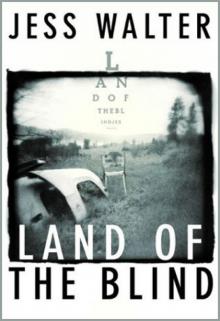 Land of the Blind
Land of the Blind Don't Eat Cat
Don't Eat Cat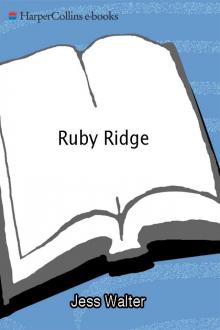 Ruby Ridge: The Truth and Tragedy of the Randy Weaver Family
Ruby Ridge: The Truth and Tragedy of the Randy Weaver Family Citizen Vince
Citizen Vince Beautiful Ruins
Beautiful Ruins We Live in Water
We Live in Water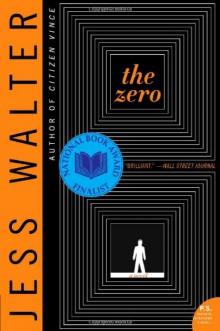 The Zero: A Novel
The Zero: A Novel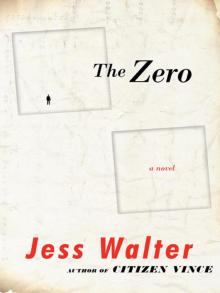 The Zero
The Zero The Cold Millions
The Cold Millions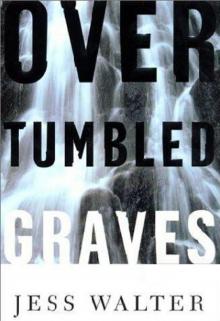 Over Tumbled Graves
Over Tumbled Graves We Live in Water: Stories
We Live in Water: Stories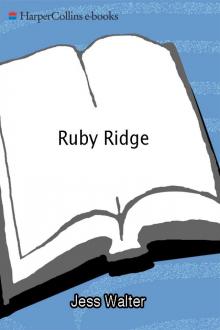 Ruby Ridge
Ruby Ridge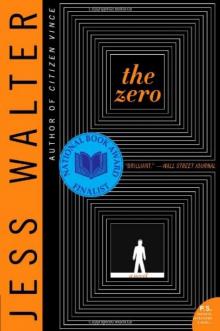 (2006) The Zero
(2006) The Zero (2004) Citizen Vince
(2004) Citizen Vince